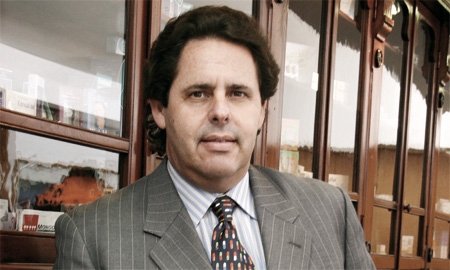One of the areas in which Chile truly stands out in the region is in pharmaceuticals and medical research. Some 40 companies are active in pharmaceutical production and local laboratories account for over half of the total market in value terms. According to the Economist Intelligence Unit, the value of pharmaceutical exports totaled around US$105 million in 2009 – a relatively small figure – yet Chilean laboratories are making headway in innovative products and are increasing their international activities.
“Chile has a disadvantage that it has converted into an advantage: our size. We have a small population like Israel, Singapore or Norway. At 17 million, our population represents a small domestic market. In order for companies to develop as much as they have here, they need a global vision. This is why you see so many Chilean companies, such as CFR, active elsewhere in Latin America and even in Southeast Asia,” says Alejandro Weinstein, CEO of
Corporacion Farmaceutica Recalcine (
CFR). “This has been done through hard work, climbing up the ladder – not taking the elevator – and doing things well, bit by bit. I think this characterizes Chilean businesspeople in general.”
CFR is a leading local pharmaceutical manufacturer that does its own R&D and has international agreements, prestigious certifications, modern plants, and a long history as one of Chile’s most reliable sources of medicines.
‘In order for companies to develop as they have here, they need a global vision, which is why you see so many Chilean companies, such as CFR, active elsewhere in Latin America’ ‘Creativity is as important as reading and writing in innovative companies’ ‘Our publications
concentrate on areas of interest
in molecular biology, biomedicine
and molecular
physical chemistry. quality prevails over quantity’ |
Established in 1922 by Nicolas Weinstein Rudoy, son of Ukrainian immigrants and grandfather of the current CEO, CFR – originally called Botica Italiana – started off distributing imported products and also manufacturing a few of its own. CFR’s first medicine was called Recalcine, a calcium-based product. Soon after, Dr. Weinstein’s company developed another product, Aliviol, which became the most commonly used analgesic in Chile. So popular was Aliviol that Germany’s Bayer decided to buy the rights to the product as its own aspirin products simply couldn’t compete.
The 1940s marked a decade of paramount importance for both the company and the country, as it was the first time penicillin was introduced. From here on, CFR’s growth was unstoppable. Today, the company’s products are sold in 20 countries in Latin America and Southeast Asia, and it has eight pharmaceutical plants located in Chile, Argentina, Colombia and Peru. Another two are currently under construction.
CFR’s largest factory, the Pharmafuturo complex, is the most modern in the Southern Cone and was designed under Good Manufacturing Practice (GMP) guidelines. Moreover, Pharmafuturo’s rigorous standards have earned it certification from the University of Maryland, which testifies to the quality and efficiency of CFR’s products.
Mr. Weinstein highlights CFR’s attention to innovation – a product not only of financial investment but also of the quality of its human resources. “Creativity is as important as reading and writing in innovative companies,” he says.
The CEO adds that CFR has Chile’s first biotechnology consortium in association with the
Pontificia Universidad Catolica and the government, as well as an agreement with the Institut Pasteur. “We have a joint venture with Institut Pasteur to develop a new drug called monoclonal antibodies. This is the new revolution in medicine. They’re biotechnology products that are no longer produced through chemical synthesis, but rather through genetically modified bacteria. Institut Pasteur chose CFR as their Latin American partner,” explains Mr. Weinstein.
Aside from human medicine, CFR has ventured into veterinary and farming sciences and marine biotechnology.
Feeding Chile’s knowledge-based industries, such as these, are its universities, whose graduates are meeting with ever more interesting professional opportunities.
Universidad Andres Bello (
UNAB) is a private Chilean university, founded in 1988 after the Law of Higher Education of 1980 allowed for the entrance of private universities and helped raise enrolment (in 1980 there were just 110,000 students at the university level; today, this number is flirting with the 1 million mark).
Even though UNAB is just over 20 years old, it has an enrolment of some 40,000 students with campuses in Santiago, Viña del Mar and Concepcion. Moreover, it has already established itself in ‘top-of-mind’ polls among private universities.
Though private, the university prides itself on representing “Chile’s socio-economic pyramid in its classrooms,” as UNAB’s rector Dr. Pedro Uribe puts it.
UNAB offers 63 undergraduate programs, 45 master’s degrees and seven doctorates, all in a wide variety of areas ranging from journalism to psychology to law to architecture to engineering. In 1993, the university introduced Chile’s first program in aquaculture, in which students team up with small businesses to propagate more sustainable fishing practices.
Today, UNAB’s strength lies in research – indeed, UNAB is the most research-intensive private university in Chile today, as seen in the university’s publications.
In research and information analysis group SCImago’s institutions rankings, half of UNAB’s journals and publications are considered among the top 25% most relevant and important, or “Q1”. Dr. Uribe explains this high success rate: “Our publications concentrate on areas of interest in molecular biology, biomedicine and molecular physical chemistry. Quality prevails over quantity.”
Member of the Laureate International Universities (LIU) network, UNAB receives hundreds of students annually from abroad, including some 150 from California, the University of Chicago and Columbia University.

0 COMMENTS